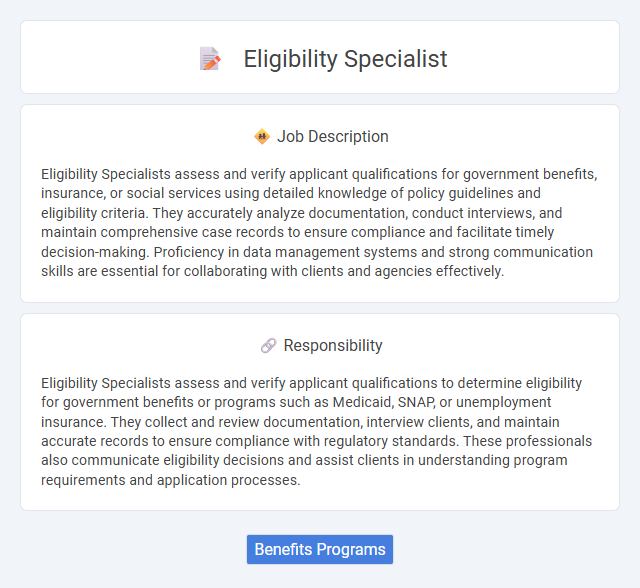
Eligibility Specialists assess and verify applicant qualifications for government benefits, insurance, or social services using detailed knowledge of policy guidelines and eligibility criteria. They accurately analyze documentation, conduct interviews, and maintain comprehensive case records to ensure compliance and facilitate timely decision-making. Proficiency in data management systems and strong communication skills are essential for collaborating with clients and agencies effectively.
Individuals with strong attention to detail and excellent organizational skills are likely suitable for an Eligibility Specialist role, as the job requires accurately verifying client information and determining eligibility criteria. Candidates who are comfortable working within strict guidelines and possess good communication abilities may be well-suited for interacting with clients and coordinating with various agencies. Those who prefer fast-paced environments and can handle confidential information responsibly have a higher probability of thriving in this position.
Qualification
Eligibility Specialists typically require a high school diploma or equivalent, with many employers preferring candidates holding an associate or bachelor's degree in social work, public administration, or a related field. Strong knowledge of eligibility criteria, public assistance programs like Medicaid and SNAP, and proficiency in data entry and case management software are essential qualifications. Excellent communication skills and the ability to interpret regulations and assess client information accurately are crucial for success in this role.
Responsibility
Eligibility Specialists assess and verify applicant qualifications to determine eligibility for government benefits or programs such as Medicaid, SNAP, or unemployment insurance. They collect and review documentation, interview clients, and maintain accurate records to ensure compliance with regulatory standards. These professionals also communicate eligibility decisions and assist clients in understanding program requirements and application processes.
Benefit
An Eligibility Specialist likely plays a crucial role in determining individuals' qualifications for various programs, which may result in accessing significant benefits. Their expertise probably enhances the efficiency and accuracy of eligibility assessments, reducing errors and improving client satisfaction. Employers might offer strong benefits packages to attract skilled candidates, reflecting the position's vital contribution to organizational success.
Challenge
Eligibility Specialist roles often present challenges related to accurately interpreting complex regulations and determining applicant eligibility amid frequently changing guidelines. Navigating high volumes of cases while maintaining attention to detail increases the likelihood of encountering stressful situations. Such challenges may require strong analytical skills and adaptability to ensure fair and efficient decision-making.
Career Advancement
Eligibility Specialists play a crucial role in determining client qualifications for various programs, offering extensive opportunities for career advancement through specialization in areas like healthcare, social services, or government assistance programs. Developing expertise in regulatory compliance, data analysis, and client advocacy can lead to roles such as Senior Eligibility Specialist, Program Coordinator, or Policy Analyst. Pursuing certifications and advanced degrees in social work, public administration, or healthcare management further enhances prospects for leadership positions within public and private sector organizations.
Key Terms
Benefits Programs
Eligibility Specialists play a critical role in assessing and determining individuals' qualification for various benefits programs such as Medicaid, SNAP, and unemployment assistance. They review applications, verify documentation, and ensure compliance with program guidelines to facilitate timely access to essential social services. Their expertise helps optimize resource allocation and supports vulnerable populations in securing necessary financial aid and healthcare coverage.
 kuljobs.com
kuljobs.com